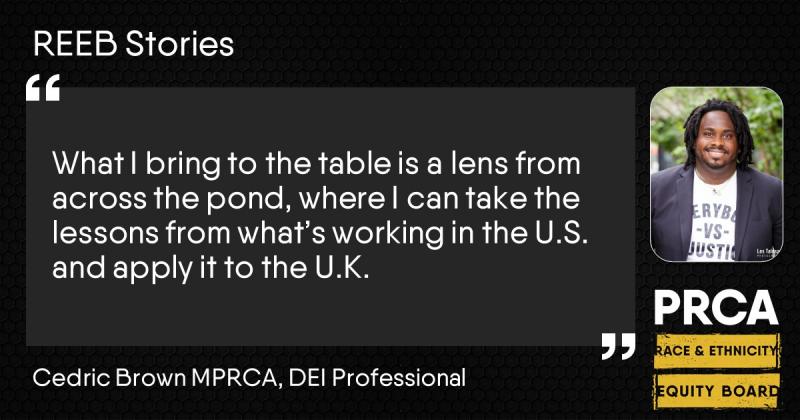
The PRCA Race and Ethnicity and Equity Board’s work has well and truly begun by tackling the ethnicity pay gap in PR and communications and demanding a psychologically safe, racist-free environment that is fair and equitable across all ethnicities. The conversations being had on the Board and with the wider industry are not easy. But as REEB’s Chair Barbara Phillips so aptly wrote, “it's easier than having to hold your tongue, absorb microaggressions, and in some cases, crush your dreams in an effort to hold onto your job and enjoy some fleeting semblance of a career for years on end.”
The 12 REEB members bring their own unique experience and expertise to the table. As REEB’s work continues, we’re putting its members in the spotlight to find out what drives them, their PR journey and the Board’s priories moving forward.
As a member of the PRCA Race and Ethnicity Equity Board, what are you most looking forward to getting started on in the role?
Being a Stateside professional, it’s been an eye-opening experience to realize that diversity, equity, and inclusion (DEI) is a global issue in our profession. What I bring to the table is a lens from across the pond, where I can take the lessons from what’s working in the U.S. and apply it to the U.K.
What do you see as the main challenges to REEB's aims and how will the board tackle them?
Right now, we’re looking at ways to monetize our contributions. A problem with pursuing DEI in general is that organizations are trying to use it as a cheap fix to their internal culture and public image. REEB looks to demonstrate the strategic and bottom line value of DEI by integrating ourselves as an equitable partner within organizations.
How did you originally get started in public relations/communications?
I discovered PR through a course during my freshman year of pursuing a bachelor’s degree in sports management. I was fascinated by the prospect of a career that rewards your ability to communicate for organizations while getting a decent pay (as opposed to sports management where you work for little-to-no pay for years). Since my university didn’t offer PR as a major, I switched to the next closest program: marketing. But I really got my education to PR by working as a student assistant for my university’s PR and marketing department. I took the skills I learned from that opportunity and started freelancing for local groups in my community after I graduated.
What are some of the projects you have been a part of during your career that you're most proud of?
Those early years of freelancing were great because I was able to give a voice to organizations that were serving our city’s youth (Detroit, Michigan). For example, I did a little media relations for a youth amateur boxing event that attracted statewide and sporting interest. More recently, I was involved in the social media strategy behind the 2017 Nation’s Report Card, where we ending up trending on Twitter during the release of state and city district scores of math and reading for fourth- and eighth-grade students. And just last year I was running social media and website management for a racial justice organization’s ice cream partnership with Ben & Jerry’s.
What do you love most about working in the PR and communications industry, and would you still recommend this as a career?
The best thing about PR is working as an advocate for the causes, individuals, and organizations you believe in. You get to guide them in building mutually beneficial relationships so that their publics become advocates almost like you. The work never ends as you always have to find ways to keep your organization relevant in a world where so much information gets thrown out there. It’s really a rewarding challenge!
Can you share some of your experiences in the PR and comms industry that highlight some of what REEB talks of in the TOR?
I’ve always felt more comfortable being in spaces where I know that I won’t be “the only one.” For instance, a huge influence in where I chose to complete my master’s degree program came from seeing other Black students being admitted; that, and the program chair was also a Black woman. Now when I’m looking for places of employment, I browse to the organization’s website to see how many people of color are on staff. If the organization is predominantly white, it’s a significant turnoff. I make assumptions that they don’t place a significant value on DEI and question if I’ll face added pressure to perform on behalf of the entire race/ethnicity. You’d be hard pressed to find anyone who’d want to be in an environment like that. It’s why we’re working as a board to not just increase representation in PR, but to make sure that our representation is equitable.
If there was no REEB what would you being doing in this space?
I’d still be doing my work in The States: writing about DEI issues for the Public Relations Society of America’s monthly membership newsletter. I’d also still be pursuing career opportunities that’d focus on achieving justice and equity for Black people.
What is the most important thing the Board should focus on right now? (should be whatever we are currently working on – Ethnicity pay gap)
One of the best ways we can achieve equity for BAME professionals is to eliminate the pay gap. That’s why we’re working with PRCA to ensure any participating organizations adhere to equitable pay as part of the Code of Ethics. We have to start demanding accountability in order to achieve change.
Follow Cedric on Twitter here.
Follow PRCA REEB on Twitter here.
#REEBlog
